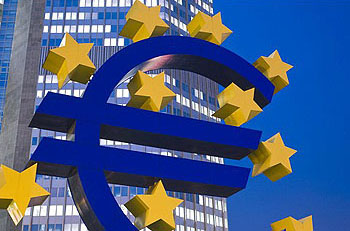Here is the final paragraph of Felix Salmon’s summary of yesterday’s summit to save the euro:
Europe’s leaders have set a course which leads directly to a gruesome global recession, before we’ve even recovered from the last one. Europe can’t afford that; America can’t afford that; the world can’t afford that. But the hopes of arriving anywhere else have never been dimmer.
I’m not sure things are quite as bad as that. It’s true that some non-euro members of the EU, notably Britain, have declined to join a deal, but I think that was always inevitable and was probably priced in long ago. The euro is going to be saved by the countries that use the euro, not anyone else. It’s also true that  the ESM, the proposed bailout fund, is too small. But as bad as that is, it might not be disastrous. A trillion euros isn’t chickenfeed, after all. In the end, success probably comes down to how seriously financial markets take the new deal.
the ESM, the proposed bailout fund, is too small. But as bad as that is, it might not be disastrous. A trillion euros isn’t chickenfeed, after all. In the end, success probably comes down to how seriously financial markets take the new deal.
I’m generally not a fan of economic theories that depend too strongly on setting expectations, but I think there’s an argument to be made that expectations play a bigger role than usual in the euro crisis. If markets believe that Europe is committed to saving the periphery countries, then interest rates will come down significantly and the periphery countries will be saved. Only Greece is still a disaster even with low interest rates. The other periphery countries can survive in the short term just by getting their borrowing costs down.
So how likely is that? My guess is that the markets aren’t too bent out of shape by Britain’s opt-out. They probably aren’t too upset by the modest size of the ESM either, as long as they believe that it’s likely to get bigger if necessary. So it all comes down to one thing: will the eurozone countries unanimously agree to the new deal? Probably so. Britain’s opt-out may be bad news generally, but the silver lining is that it makes approval more likely, since the deal now has to be done via an intergovernmental agreement rather than a treaty change. That’s good news, since if markets think approval is likely, there’s a good chance that disaster will be averted long enough to get the deal approved.
So, do I actually believe all this happy talk? Honestly, I’m not sure. I think it’s possible that today’s deal might work in the short term, but I don’t know how long the short term is these days. What’s more, the lack of mutual debt guarantees is bad news. The fact that the ECB continues to refuse to act as lender of last resort is bad news. The focus on budget deficits rather than current account imbalances is bad news. The lack of any serious plan to boost growth in the periphery countries is bad news.
In the end, that might be too much bad news. Maybe Felix is right after all: today’s deal might avert disaster for a bit, but the eurozone is still tiptoeing right up to the edge. It’s a mighty high-stakes game of chicken they’re playing.













